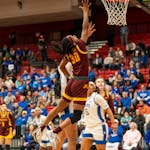The strategy is as old as the game itself: Keep feeding your physical running back the football as your offensive line bludgeons the opponent's defense, breaks its will, and keeps the opposing offense on the sideline.
It's an approach that has served P.J. Fleck well since he arrived in Minnesota, especially in big wins. For example, the Gophers got 35 minutes of possession and 121 rushing yards from Mohamed Ibrahim in the 2018 win at Wisconsin. In last year's Outback Bowl triumph over Auburn, the Gophers held the ball for 37:26, as Ibrahim rushed for 140 yards.
That strategy, however, does have a weakness: It doesn't always work if you have a porous defense. That was the case Friday night, when the Gophers fell 45-44 in overtime at Maryland.
As the Gophers prepare to play at Illinois on Saturday, a battle of two winless teams, it's clear Minnesota's offense must carry the young defense. There are 103 Football Bowl Subdivision teams that have played at least one game this season, and the Gophers rank 102nd in total defense (578 yards allowed per game) and 102nd in scoring defense (47.0 points allowed per game).
"This year we knew there would be a lot growing pains on the defensive side with a lot of younger guys playing and some inexperienced guys playing in some key positions," said Fleck, whose team lost seven starters from last year's 11-2 squad, including four NFL draftees.
Despite their clear defensive shortcomings, the Gophers still held a 17-point fourth-quarter lead at Maryland and looked poised to return with a 1-1 record.
Behind 41 carries for 207 yards and four touchdowns from Ibrahim, the Gophers twice erased 14-point deficits in the first half. All that was left was to finish the game, which seemed likely the way the ground game was churning. Ibrahim, the nation's leader at 173.5 rushing yards per game, had carried 32 times for 182 yards (5.7 per carry) through three quarters.
That all dried up in the fourth quarter, when Ibrahim, facing nine players in the box at times, gained 20 yards on eight carries. The Gophers had three fourth-quarter possessions, and Minnesota's defense badly needed the offense to bail it out with a sustained drive. Instead, the Gophers had possessions of 2:17, 2:16 and 2:26.
"Offensively, I love our poise to be able to come back from being down," Fleck said, "but very disappointed in the outcome of three drives in the end where we couldn't finish it."
One defensive stop would have made that offensive stretch less glaring. But the Gophers have forced their opponents to punt two times in two games. They are allowing 9.48 yards per play, worst in the nation by nearly 2 yards.
Maryland averaged 10.2 yards per play. The Terrapins had 18 plays go for 15 yards or longer and seven of 25 yards or more.
After Maryland had tied the score 38-38 with 3:38 left in the fourth quarter, the Gophers had a chance to answer, moving from their 25-yard-line to their 47. Ibrahim gained 1 yard on second down and was stuffed by that stacked Terrapins box for no gain on third down.
"That's my fault. One-hundred percent my fault," Fleck said of the play call. "Simple as that."
His quarterback, Tanner Morgan, fell on his sword, too.
"It was a play that had been working for us," Morgan said. " … They got the best of us there. It's football. We've just got to execute better. Honestly, in that situation, it's not about the play call, it's how we execute."
Until the fourth quarter, the Gophers offense was executing quite well, with Ibrahim leading the way. Fleck said he would like to get more carries to Treyson Potts (three rushes, 45 yards) and fellow redshirt freshman Cam Wiley, but it's tough to take the ball out of Ibrahim's hands.
"Trey and Cam have earned the right to be able to have more reps," he said. "But every rep they have, No. 24 is not on the field, and I think he's one of the best backs in the country."





